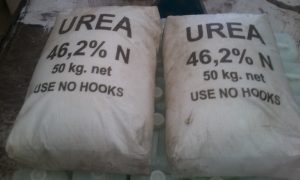What is carbamide – it is a mineral fertilizer. It is also referred to as urea. It is known since school chemistry that carbamide is the final product of protein metabolism. A deeper chemical data may tell that carbamide is an amide of carbonic acid. It exists in a form of colorless solid that has no odor, which may sound controversial due to its name, “urea”.
How carbamide relates to mineral fertilizers anyway? The point is that clear urea contains 46% of nitrogen. This is that nitrogen that is so necessary for plant growth. Moreover, urea is very soluble in water and it contains no chlorine as compared to other mineral fertilizers.
What is carbamide: pros
The use of urea leads to great results when applied on agricultural crops. It is applied as spray feeding. Carbamide may also be used in various ways and times of application on the soil.
- Main feeding. Soil is prepared before planting. Experts suggest embedding the soil right after the irrigation. It is because ammonia is evaporated on open air.
- Preplant Planting and irrigation with mineral fertilizer is performed simultaneously. However, it is prohibited to mix seeds with urea.
- Vegetative feeding. Mineral fertilizers are introduced into the soil at appropriate rates during the irrigation of crops. Otherwise the ammonia would evaporate, and the plant would not receive the feeding.
- Spray feeding of plants. Carbamide is dissolved in water, and then the plants are sprayed with the fertilizer.
Carbamide: cons
Urea is quickly decomposed into ammonia and carbon dioxide. Stalks and seeds are oxidized and damaged when contacting with products of decomposition. Insufficient care during the application of mineral fertilizers will damage the crop.
Biuret is an amide of allophanic acid, which is formed during carbamide granulation. This is a toxic organic compound which may kill living organisms, including plants. Biuret is unstable though and is quickly decomposed into organic matter. However, the crop may quite possibly be damaged when carbamide is applied as a fertilizer for seeds.
Carbamide is a potent oxidative agent. Frequent application of this mineral fertilizer will shift the soil pH to more acidic. The use of base would be required to restore the soil pH. The simplest and cheapest solution for that is to use limestone. However, one should remember that frequent manipulations with urea will lead to soil degradation.
To conclude
The use of carbamide for plant feeding is harmless to human beings. This mineral fertilizer is very soluble in water and possesses high miscibility with other substances. Urea is well-digested by plants and leads to a high increase of crop yield.
What is carbamide? It is a substance that damages the soil. However, it is not carbamide by itself, but its derivatives and products. There are two ways to solve problems with carbamide. Urea is used by agrarians once in three years to recover soil’s acidity to normal level. Other way for farmers is to refuse from carbamide and refer to harmless complex organic fertilizer. One of these would be Fortis-combi.



